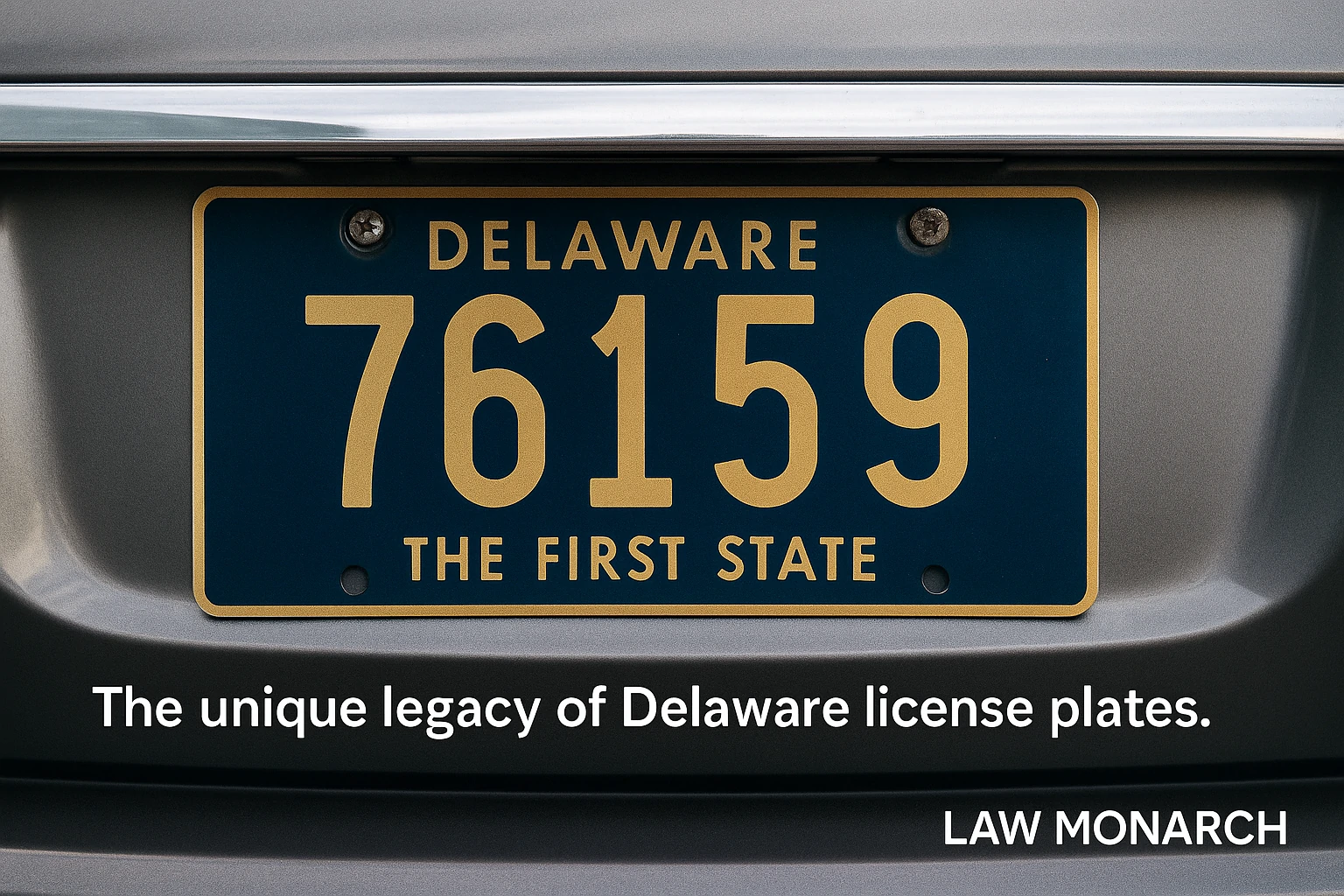License plates look simple at first. They show numbers, letters, and maybe a state name. Most people do not give them a second thought. But in Delaware, license plates tell a deeper story. They carry meaning, pride, and even serious value.
In this small state, license plates have become a symbol. Some plates cost more than cars. Others stay in families for generations. People in Delaware know that a low number or a classic look means something special. It shows status, history, and roots.
Many visitors ask why Delaware plates stand out. The plates look different from others across the country. Some appear older but stay legal. Others follow simple designs but turn heads on the road. This mystery draws attention and sparks questions.
This article breaks it all down. You will learn where Delaware plates came from, why they hold such strong value, how to get one, and what makes them unique. It uses plain words and real examples so that any reader can follow and enjoy the full story.
The Start of Delaware Plates
Delaware began issuing license plates in the early 1900s. At that time, cars were rare. Plates showed simple numbers without extra designs. The state kept things clean and easy. That plain style became part of the brand.
Low numbers got issued first. Plate #1 went to a man named William du Pont. His family name remains well known in Delaware. Over time, other early numbers went to business leaders, judges, and state officials. These plates now hold deep value.
As the years passed, the state made small updates. It changed materials from porcelain to steel and later to aluminum. It added the state name, “The First State,” to honor Delaware’s place in U.S. history. Still, the plates kept a simple look.
Delaware never went flashy. It stuck with a dark blue background and gold numbers. That mix now signals tradition. Drivers in other states often spot Delaware plates and take notice, even without knowing the full backstory.
Why Delaware Plates Cost So Much
Some Delaware plates sell for tens of thousands of dollars. Others never leave a family’s hands. That might sound odd to outsiders, but it makes sense once you understand the culture.
The value starts with scarcity. Delaware has fewer than one million residents. That means fewer license plates overall. A small state with a long history creates a rare mix. Early plates with low numbers are hard to find.
The plate number shows social rank in many circles. A single-digit plate means long family ties or high-level status. A two-digit plate still turns heads. People see those numbers and ask questions. That curiosity adds value.
Many of the most prized plates are black and gold. These “vintage-style” tags can still appear on the road if the owner keeps them registered. Some drivers keep them just to hold a piece of state history.
Special auctions take place just for Delaware plates. Some numbers pass down like heirlooms. Others change hands through private deals. The state allows plate transfers through a formal process, which helps fuel this rare market.
Where to Get a Delaware Plate
New plates come from the Delaware Division of Motor Vehicles (DMV). Anyone who registers a car in the state must get a plate. The DMV assigns a standard plate number unless you request a custom one.
To get a classic-style black and gold plate, you need to contact an authorized plate maker. These companies recreate older designs in approved formats. You must still register your vehicle through the DMV, but the plate itself can follow the vintage style.
If you want a low-digit number, you must buy it. These plates appear at auctions or on resale platforms. The DMV allows legal transfers, but the process takes time and paperwork. Some law firms even help handle plate transfers because of the value involved.
Drivers who inherit a plate from a relative can keep it. In some families, plates stay in use for decades. They move from car to car, generation to generation. That kind of history is rare in most places but common in Delaware.
The Meaning Behind the Plate
A license plate in Delaware can say more than words. It may reflect a person’s past, a family name, or a place in the community. People often ask about the story behind a certain number.
Drivers feel pride when they own a classic plate. It shows that they belong to a long tradition. Many locals see the plate not just as a tag, but as a symbol of their roots. Outsiders may not fully understand it, but they often feel the charm.
Some numbers have ties to local history. A low number might link to an old company, school, or public office. These plates carry meaning beyond the car. They turn into talking points and often bring people together.
Even businesses join the plate tradition. Some firms buy low-number plates to build local trust. They place them on company vehicles to show history and loyalty to the state.
Plate Rules in Delaware
The Delaware DMV has clear rules about plates. Every car must display a valid plate, either the standard type or an approved custom plate. Plates must be clean and easy to read. Damaged or unreadable plates must be replaced.
If you want to use a black and gold replica, you need DMV approval. You must also keep the original metal plate in your vehicle. The state requires this step to avoid fake or illegal use.
Transferring a plate must go through the DMV. You cannot just sell or give away a plate without paperwork. This helps track ownership and protect the market.
Custom plates must follow format rules. You cannot choose words that are offensive, unclear, or too long. The DMV checks each request before printing the plate. This step reflects the kind of legal standards that vary by state, as seen in how Georgia handles implied consent laws.
Why the Tradition Stays Strong
Delaware may be small, but it has a big sense of pride. That pride shows through its plates. People treat them with care. They see them as more than tools for the road.
The plate market keeps growing. Each year, more people try to get rare numbers. This demand shows that the tradition still matters. As new drivers learn the history, they want to join the story.
Even younger generations show interest. Some want the same number their parents or grandparents had. Others start small and trade up as time goes on. The culture around Delaware plates does not fade. It grows stronger.
The state supports this in small ways. It allows vintage plates to stay on the road. It keeps rules clear and the system open. That approach echoes how other states enforce state rules, like California’s window tint law.
Conclusion
Delaware license plates hold a story that most states cannot match. They show history, pride, and value in a simple format. What looks like just a number can carry deep meaning. It might reflect a family’s journey, a person’s rank, or a love for the state itself.
From the early black and gold designs to the auctions of today, Delaware plates continue to matter. They move beyond the basic purpose of ID tags. They serve as badges of honor, keys to state culture, and even smart investments.
If you drive through Delaware and spot a low-number plate, now you know what it means. It’s not just a number. It’s a piece of history on wheels.
Common Questions
Q. Why do Delaware license plates cost so much?
Some Delaware plates, especially low-digit ones, are rare and tied to long family histories. This makes them valuable, and the demand adds to their price.
Q. Can anyone get a black and gold Delaware plate?
The black and gold style is allowed with DMV approval. You must register the plate through the state and use a verified plate maker.
Q. Are Delaware license plates legal to transfer between people?
Delaware lets people transfer plates if they follow state rules and file the right forms with the DMV.
Q. What do low numbers on a plate mean in Delaware?
Low numbers often mean the plate has been in the family for generations or was issued long ago. Many see these as signs of local pride or status.
Q. Do Delaware plates work in other states?
A Delaware plate is valid if the car is registered in Delaware. You must live or own property in the state to keep it legally active.
This article is for general information only. It does not give legal, financial, or vehicle registration advice. Delaware license plate rules and values may change. Always check with the Delaware Division of Motor Vehicles or a qualified professional before you take any action.




